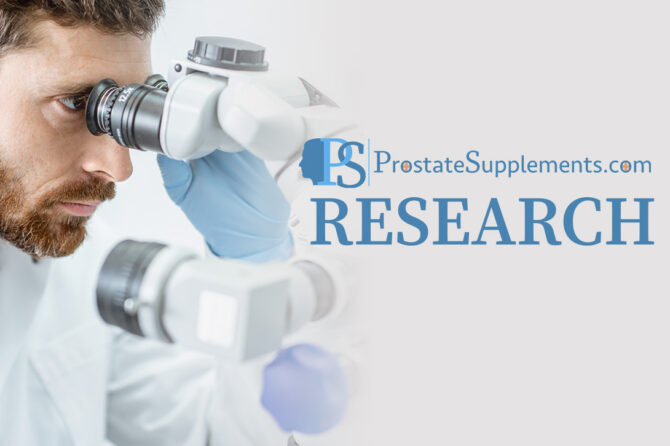
Nutmeg (Myristica fragrans): An Evidence-Based Guide for & Men’s Prostate Health
Nutmeg is the seed of Myristica fragrans, an evergreen tree native to Indonesia’s Banda (Spice) Islands. The reddish aril surrounding the seed is processed separately as mace; both spices share aromatic compounds but have distinct flavors. Nutmeg contains 5–15% volatile oil with notable constituents including sabinene, myristicin, eugenol, elemicin, β-myrcene, and α-pinene. These compounds underpin nutmeg’s characteristic aroma and many of its reported biological activities. (PMC, PubMed)
Health Effects (What the Science Shows)
Antioxidant & Anti-inflammatory activity
Preclinical studies (cell and animal models) consistently show antioxidant and anti-inflammatory effects from nutmeg seed extracts and essential oil, including reductions in pro-inflammatory mediators (e.g., NO, TNF-α, IL-6, IL-1β) and modulation of COX-2 and substance P pathways. These mechanisms are relevant to chronic inflammatory states, though clinical confirmation is limited. (msjonline.org, PMC)
Comprehensive reviews of nutmeg essential oil and myristicin support these findings, citing antimicrobial, anti-inflammatory, analgesic, and other bioactivities across in vitro and animal studies. Human evidence remains sparse and mostly preliminary. (PMC)
Metabolic & other experimental findings
Recent reviews describe possible antidiabetic and lipid-modulating actions in animal models and potential wound-healing effects in preclinical settings (mace oil). These are hypothesis-generating rather than prescriptive for patient care. (PMC)
Safety and toxicity
At culinary amounts, nutmeg is generally considered safe for most adults. However, larger “medicinal” or recreational doses can cause acute intoxication due to alkenylbenzenes (notably myristicin and safrole): agitation, hallucinations, tachycardia, nausea, and, rarely, severe toxicity. Case series document symptoms after ~5–10 g (≈2 tsp) of ground nutmeg, with some reports at ~14–28 g and higher. Safrole is a genotoxic carcinogen; risk assessments advise minimizing exposure to concentrated essential oils. Bottom line: avoid high doses and essential oil ingestion unless supervised in a research/clinical setting. (PMC, ScienceDirect, European Food Safety Authority, MDPI)
Men’s Health Focus
Prostate health
- Direct evidence: There are no robust human trials showing that nutmeg treats benign prostatic hyperplasia (BPH) or lowers PSA. Most phytotherapy data for BPH involve other botanicals (e.g., Serenoa repens, Urtica dioica, pygeum, pumpkin seed, pine bark) rather than nutmeg. (PMC)
- Indirect rationale: Because inflammation and oxidative stress contribute to lower urinary tract symptoms (LUTS) and BPH biology, nutmeg’s anti-inflammatory/antioxidant actions in preclinical models are theoretically relevant—but this remains speculative for prostate outcomes until clinical studies are done. (msjonline.org)
Clinical takeaway: Do not use nutmeg as a prostate therapy. Men with LUTS/BPH should rely on guideline-supported options (behavioral strategies, α-blockers, 5-α-reductase inhibitors, or evidence-based phytotherapy) and discuss supplements with a clinician. (NCBI)
Urinary function & benefits
There are no controlled human data showing nutmeg improves urinary flow, frequency, nocturia, or related LUTS. Again, mechanistic anti-inflammatory effects are interesting but unproven in this domain. If urinary symptoms are present, seek medical evaluation to rule out BPH, infection, stones, or neurologic causes. (PMC)
Sexual function (adjacent interest)
Several animal studies report aphrodisiac-like effects (increased mounting frequency, reduced latency) with ethanolic nutmeg extracts, likely via CNS pathways. These findings do not establish safety/efficacy for humans, but they explain traditional use claims. (PMC, BioMed Central)
Uses & Applications (Healthcare, Wellness, Nutrition)
- Culinary spice: Commonly used in sweet and savory foods; fresh-grated nutmeg offers stronger aroma. Culinary use provides small exposures to bioactive compounds without approaching toxic thresholds. (Wikipedia)
- Aromatherapy/topicals: Nutmeg essential oil appears in topical formulations (e.g., balms) and fragrance. Preclinical data suggest anti-inflammatory and analgesic properties; clinical evidence is minimal. Do not ingest essential oil. Patch-test topicals to avoid irritation or sensitization. (PMC)
- Traditional medicine: Historically used for digestive discomfort, pain, and as a warming aromatic. Modern evidence is limited outside experimental models; claims should be viewed cautiously. (PubMed)
Ingestion Methods & Best Practices
Forms
- Whole seed (fresh-grated) or ground spice: For food seasoning.
- Extracts / capsules / tinctures: Occasionally marketed, but standardized dosing and clinical efficacy are not established.
- Essential oil: For fragrance/topical use; not for oral self-administration due to toxicity concerns (safrole/myristicin). (European Food Safety Authority)
Practical, safer amounts (adults)
- Culinary seasoning: Pinch to 1/4 teaspoon (≈0.5–1 g) per serving is typical in recipes and is well below doses associated with intoxication. Avoid “medicinal” large single doses. Case reports note toxicity starting around 5 g(≈2 teaspoons). (PMC, njmonline.nl)
Preparation tips
- Grate whole nutmeg just before use to preserve aroma. Store in an airtight container away from heat and light. (Wikipedia)
Who should be cautious or avoid
- Pregnancy & breastfeeding: Avoid large amounts or concentrated products due to case reports of toxicity and theoretical risks from alkenylbenzenes. Stick to normal culinary quantities. (Drugs.com)
- Liver disease or on hepatically metabolized drugs: Be cautious; alkenylbenzenes undergo hepatic bioactivation. Consult a clinician before using concentrated extracts. (PMC)
- Psychiatric/CNS conditions or interacting medications: High doses can cause CNS effects; avoid non-culinary dosing and essential oil ingestion. (PMC)
- Allergy/sensitization: Essential oil can irritate skin and airways; patch-test topicals. (European Food Safety Authority)
Bottom Line
Nutmeg is a flavorful culinary spice with compelling preclinical evidence for antioxidant and anti-inflammatory effects. However, there are no good clinical trials showing benefits for prostate health, urinary symptoms, or other specific medical outcomes. Keep intake to normal culinary amounts, avoid ingesting essential oils or large doses, and consult a healthcare professional before using concentrated preparations—especially if you have urinary symptoms, take medications, or have chronic conditions. (PMC, European Food Safety Authority)
Leave a reply

Leave a reply